Connecting 300m people in Africa to electricity could boost GDP by $500bn by 2040 – BCG
In Africa, 600-million people lack access to electricity, despite global energy poverty having decreased by about 80% since 2010.
By providing electricity access to 300-million of those Africans who lack access to electricity by 2030 could boost Africa's GDP by $500-billion by 2040, says management consulting firm Boston Consulting Group (BCG) Climate, Sustainability and Energy South Africa practice lead Kesh Mudaly.
Given the drop in global energy poverty compared with its prevalence in Africa, progress has stalled, but reaching this goal will unlock significant foreign direct investment, create millions of jobs, improve school graduation rates, reduce infant mortality and avoid 350-million tons of CO₂, which will ensure that African manufacturers can remain export-competitive in the face of clean-energy focused trade tariffs, he says.
To meet electrification targets, Africa will need to scale-up a new generation of local independent power producers and energy infrastructure firms capable of delivering complex projects efficiently, attracting long-term capital and building resilient regional operations.
Without these local champions, the sector will remain overly dependent on external actors and exposed to delivery risk, BCG says in the 'Unleashing Africa: Powering Prosperity Through Energy Access' report.
The report sets out five focus areas to achieve this, namely, strengthening government planning and reforms, upgrading and expanding grid infrastructure, scaling-up distributed renewable energy and innovation, unlocking capital through innovative financing and partnerships and driving inclusion and productive use for impact.
Following the examples set by Kenya and Uganda, governments need to set clear electrification targets, backed by detailed roadmaps that identify least-cost solutions, including grid, minigrid and offgrid solutions for every community. This includes integrated energy planning to coordinate efforts across ministries and donors.
Policy and regulatory reforms are needed to create an environment where projects can succeed, such as by simplifying licensing, ensuring tariffs allow cost recovery and improving utility performance, the report says.
Further, while the focus has been on generation projects, it is imperative that African governments invest in transmission and distribution networks to connect population centres and industrial zones, and to transmit power from new generation projects to demand hubs, the report states.
Additionally, with many African countries dependent on centralised generation and distribution models, innovative thinking around how to harness technology such as solar PV and small-scale wind power solutions will be key to rapid electrification.
For example, Nigeria’s government, with support from development finance organisation the World Bank, is implementing an offgrid electrification project that subsidises private developers to deploy solar minigrids to villages. The initiative is aimed at reaching 2.5-million people and 70 000 businesses in the next few years, BCG notes.
However, one of the biggest challenges for energy projects is reaching financial close for such projects in Africa, despite the potential scale of the opportunity.
In addition to traditional funding partners, such as development finance institutions and banks, there are innovative new products, including green bonds, carbon credit off-set projects and climate-finance specific options, that can help to address this gap.
“Even with this diverse range of funding options, the ability to align stakeholders with objectives remains a challenge,” the report highlights.
African nations can work with experienced countries, such as India or Brazil, to adapt successful financing models. Brazil’s opening of transmission grid infrastructure to private concessions in the 1990s quadrupled grid capacity and universal access.
Further, in terms of impact, African countries need to be wary of an electrification-without-empowerment scenario. Delivering electrons to people’s homes is insufficient, as the goal is to translate energy access into real socioeconomic development, BCG says.
Countries should look to models such as rural community renewable energy empowerment organisation Solar Sister in West and East Africa, which trains and supports women as entrepreneurs to distribute clean-energy products in their communities.
Solar Sister has trained more than 5 000 women entrepreneurs and has reached 1.8-million people with solar lights and clean cooking stoves to date.
Similarly, initiatives that encourage productive uses of energy, such as helping small businesses acquire electric equipment or facilitating microloans for agribusiness, can turn new electricity connections into higher incomes and employment, BCG points out.
“When Africa’s public and private sectors align efforts, backed by data-driven planning and community engagement, change happens.
“With urgency and unity of purpose in the next five years, the continent can dramatically accelerate energy access and move toward a future where every African has the opportunity that electricity provides,” the report says.
Article Enquiry
Email Article
Save Article
Feedback
To advertise email advertising@creamermedia.co.za or click here
Announcements
What's On
Subscribe to improve your user experience...
Option 1 (equivalent of R125 a month):
Receive a weekly copy of Creamer Media's Engineering News & Mining Weekly magazine
(print copy for those in South Africa and e-magazine for those outside of South Africa)
Receive daily email newsletters
Access to full search results
Access archive of magazine back copies
Access to Projects in Progress
Access to ONE Research Report of your choice in PDF format
Option 2 (equivalent of R375 a month):
All benefits from Option 1
PLUS
Access to Creamer Media's Research Channel Africa for ALL Research Reports, in PDF format, on various industrial and mining sectors
including Electricity; Water; Energy Transition; Hydrogen; Roads, Rail and Ports; Coal; Gold; Platinum; Battery Metals; etc.
Already a subscriber?
Forgotten your password?
Receive weekly copy of Creamer Media's Engineering News & Mining Weekly magazine (print copy for those in South Africa and e-magazine for those outside of South Africa)
➕
Recieve daily email newsletters
➕
Access to full search results
➕
Access archive of magazine back copies
➕
Access to Projects in Progress
➕
Access to ONE Research Report of your choice in PDF format
RESEARCH CHANNEL AFRICA
R4500 (equivalent of R375 a month)
SUBSCRIBEAll benefits from Option 1
➕
Access to Creamer Media's Research Channel Africa for ALL Research Reports on various industrial and mining sectors, in PDF format, including on:
Electricity
➕
Water
➕
Energy Transition
➕
Hydrogen
➕
Roads, Rail and Ports
➕
Coal
➕
Gold
➕
Platinum
➕
Battery Metals
➕
etc.
Receive all benefits from Option 1 or Option 2 delivered to numerous people at your company
➕
Multiple User names and Passwords for simultaneous log-ins
➕
Intranet integration access to all in your organisation


















